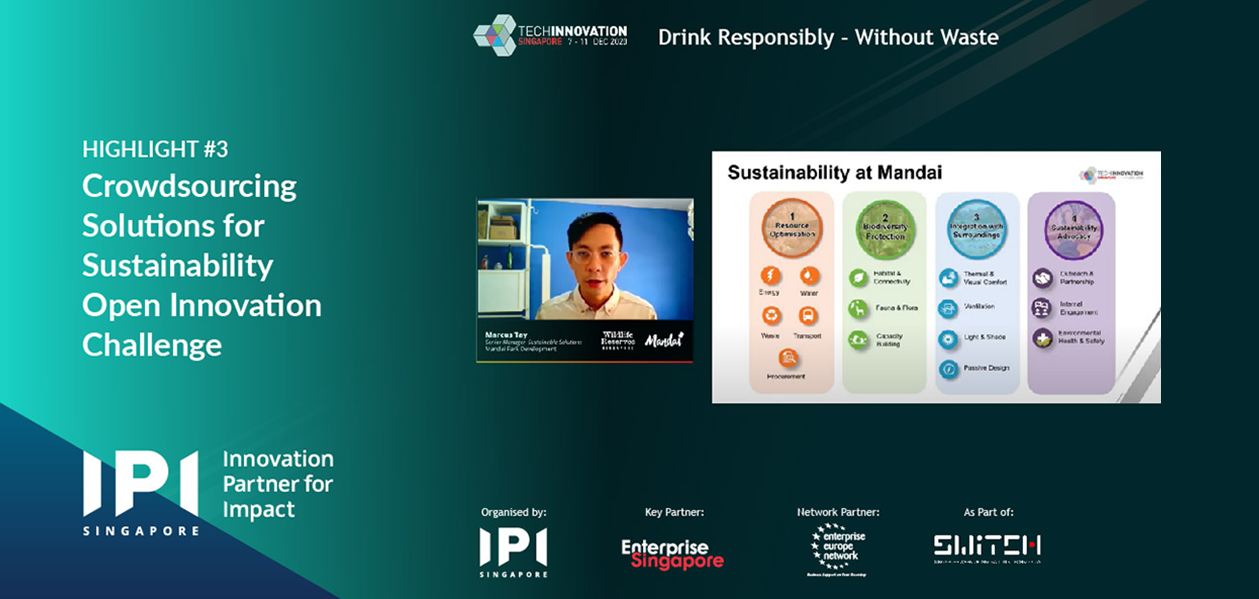IPI to give Sustainability a boost through new Innovation Challenge
As the world’s population races towards a predicted 10 billion by 2050, our environment is coming under more stress. Climate change is a systemic problem. Its effects will hit every firm directly or indirectly. Increasingly, citizens will push governments to drive tougher regulations to safeguard the environment. Enterprises need to get ahead of the challenges posed by climate change and step up their action against it by adopting innovative sustainable practices. Globally; individuals, public agencies and companies - small and large - will need to work together to lower their environmental footprint.
Doing so whilst protecting a company’s bottom line can be mitigated through open innovation. “As global trends in sustainability accelerate, incorporating sustainable practices becomes an imperative for businesses and those who can do so profitably will have a competitive advantage over others,” said Dr Tan See Leng, Singapore’s Second Minister for Trade and Industry speaking at TechInnovation 2020 organised by IPI, a subsidiary of Enterprise Singapore.
Several themes emerged during this year’s Sustainability Open Innovation Challenge (SOIC) at TechInnovation 2020 with organisations such as Danone, Haier and Dole setting ambitious challenges for enterprises and start-ups to develop new technologies. The management of waste, particularly plastic, dominated the clarion calls from 15 different public and private entities which also included; Mandai Park Development, ENEOS Holdings, Clariant, Singapore’s National Environment Agency, Juice Products New Zealand, and the Sentosa Development Corporation.
Curing the plastic pandemic
The proliferation of single-use plastic around the world is a significant driver of climate change and companies that use a lot of it to package their products know they must find alternative solutions. Since 1950, the world has created 6.3 billion tonnes of plastic waste, the majority of which has never been recycled, according to a 2017 study published in research journal, Science. Meanwhile, the cost of packaging makes up 7 to 11% of the total cost of a product for most FMCG companies. Any opportunity to reduce packaging cost while contributing to sustainability will be a win-win situation for these companies.
Packaging is one of the most problematic types of fossil-based plastic waste, as this year’s SOIC highlights. It is typically designed for single use and is extremely difficult to recycle. Meanwhile, a constant increase in the use of flexible and multi-layered packaging has complicated efforts to separate waste prior to recycling. Haier, a home appliances and consumer electronics company, invites partners to help it find a new material that can be used for packaging bulky items in transit. While shaped polystyrene buffers keep our washing machines intact, it fails to meet the company’s sustainable packaging mission. The stipulations for an alternative are fairly stringent and any entity that can meet the mark could be in high demand by similar multi-nationals.
Getting rid of plastic entirely will be difficult, admits Barbara Guerpillon, head of Dole Ventures for Dole Asia Holdings, a packaged food company. However, the company is open to other solutions that will reduce its reliance on fossil-based plastic packaging and can, crucially, protect soft fruits such as bananas, pineapples and papayas in transit. Danone, a food company, has a similar feat on its hands as it looks to reduce the 4,000 tonnes of packaging waste across three geographies. They have asked for submissions that will help them re-purpose, re-use and recycle bag-in-box and pouch packaging.
Rethinking and repurposing food waste
Eradicating or repurposing food waste was widely discussed by several companies participating in the event including Dole and Juice Products New Zealand (a subsidiary of Sumitomo Corporation). The latter is looking for a partner to create health synbiotics with carrot pomace. Closer to home, Singapore’s National Environment Agency (NEA) is looking for innovators that will help pave the nation’s path to zero waste under the Resource Sustainability Act. Food waste is one of the largest waste streams in Singapore with high generation and low recycling rates. The NEA is looking for solutions that will reduce food waste disposal from commercial premises and enhance recycling efforts. The test for innovators will be to create a robust waste treatment device that can fit into tight spaces.
Winning hearts and minds
Technology alone is no silver bullet and innovators entering this year’s challenge need to create a holistic response that can help to change consumer behaviour and mindset. The Mandai Park Development strives to eradicate all disposable cups from its four parks that currently use 115,000 cups a month. They are seeking for partners to help develop a vending drinks dispenser with a reusable cup deposit scheme. Success will be pinned on a visitor bringing the cup back. Similarly, the NEA’s grant-call recognises that stakeholders including flat tenants, cleaning staff and customers do not have the habit or adequate knowledge of segregating food waste, which may result in low participation rates in recycling. Technology may only go some way to resolve this issue. Creative and innovation solutions that will nudge and shift the current mindset will be needed.
What is clear from this year’s sustainability challenge is that some of the world’s most well-established companies are adopting the concept of open innovation to crowdsource externally for creative solutions. For smaller innovators, it is an exciting opportunity to make a huge difference in reducing our impact on the planet. Interested parties may view the challenge sponsors' briefing sessions here, and submit their proposals to the Sustainability Open Innovation Challenge through https://sustainability.innovation-challenge.sg/. The deadline for proposal submissions is 19 February 2021, 12 pm (GMT+8).

